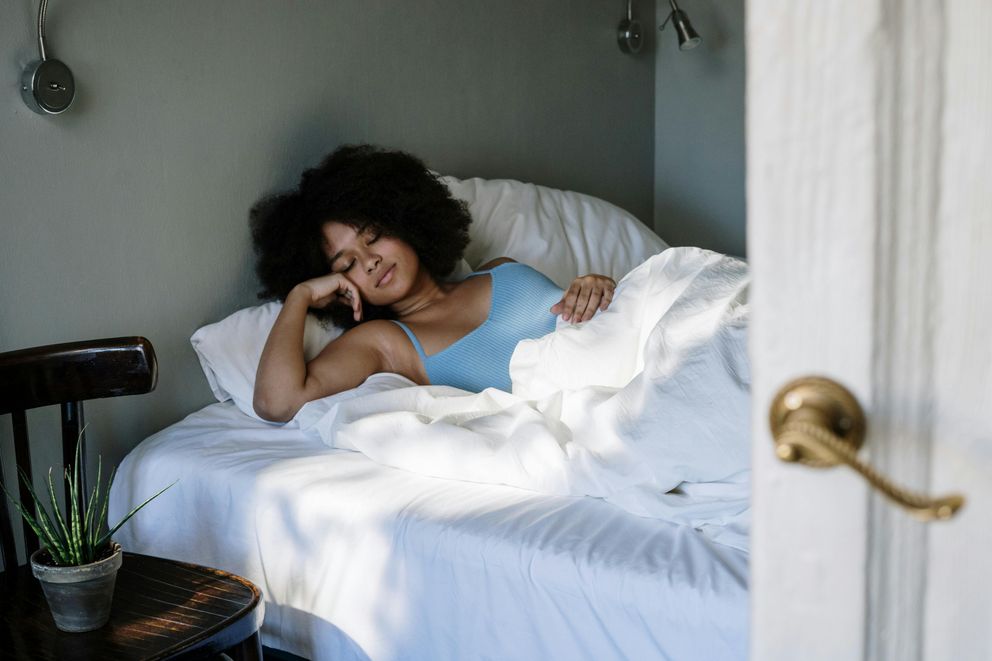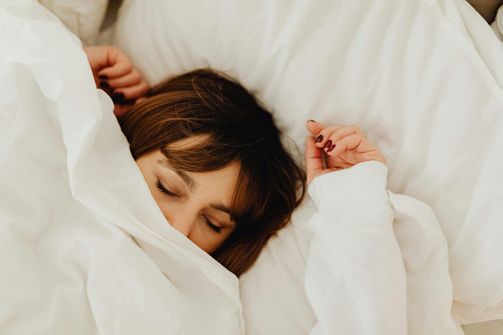
Benefits of Sound Healing and Maximizing Your Sleep Quality
Getting a good night’s sleep is essential for overall well-being, but in today’s world, many of us struggle to relax before bed—especially women manag...

Welcome back to our cozy corner of the internet, where we untangle the mysteries of sleep, armed with a flashlight of science and a map of personal stories. Melatonin has been our ally in the quest for better sleep, especially among women.
But there’s a twist in the tale—reports of nightmares. Let’s dive into the science, shall we?
Picture your brain hosting a tiny, diligent worker named Melatonin. This hormone, which your pineal gland starts releasing as the sun sets, is crucial for signaling your body that it’s time to wind down. However, not everyone’s internal factory produces enough, prompting a turn to supplements.
In the U.S. alone, more than 55,000 adults aged 20 and older reported their dietary supplement use to the survey from 1999 to 2018, according to National Institutes Of Health.

Melatonin use increased from 0.4% of survey respondents in 1999 to 2000 to 2.1% in 2017 to 2018. This trend was similar between men and women, and across age groups.
Melatonin, our body’s natural sleep signal, surges as night falls, peaking in the early hours to help us drift off. This “darkness hormone” sees its levels rise significantly from dusk till dawn, a rhythm deeply intertwined with the cycle of daylight and darkness.
Yet, modern lifestyles challenge this ancient rhythm; the blue light from screens can slash melatonin production by over 50%, as highlighted in a study from the Journal of Clinical Endocrinology & Metabolism. This interference not only delays our sleep onset but also shortens the duration of melatonin’s nightly peak, pushing our internal clocks out of sync.
The impact of light on our sleep hormones underscores the fragile balance between our technological advancements and our biological heritage. With the CDC labeling insufficient sleep a public health epidemic, it’s clear that our evening habits are at odds with our physiological needs.
Reducing evening screen time and being mindful of our exposure to light can help maintain our natural melatonin levels, supporting healthier sleep patterns. In a world where our screens often dictate our schedules, tuning back into our body’s natural rhythms might just be the key to unlocking a better night’s sleep.
Lots of women find themselves reaching for melatonin, and there’s good reason. Hormones can make sleep tricky — think about how your sleep can get off track with your period, during pregnancy, or when menopause hits.
A survey by the National Sleep Foundation found that about 30% of women have tried some kind of sleep aid, and melatonin is a favorite. It’s not just hormones though; things like stress can also make getting a good night’s sleep harder for women. Since melatonin is pretty gentle and doesn’t get you hooked, it’s a popular pick for those looking to catch some more Z’s.
REM sleep, where dreams shine in full cinematic glory, is a brain activity hub, taking up about 20-25% of an adult’s sleep cycle. This stage is crucial for more than just crafting vivid dreams; it’s when our brains process emotions, solidify memories, and learn. Studies, like one in Neuron, show REM’s key role in emotional health and memory.
Yet, during this busy brain phase, our bodies are in REM atonia, a state of paralysis that keeps dream action in the mind, not the bed. Disrupting REM, as seen in research from the Journal of Neuroscience, can mess with memory and increase anxiety, proving that our night-time narratives are more than just stories—they’re part of our mental and emotional upkeep.

The role of melatonin in influencing REM sleep, and by extension, our dreams, is a fascinating puzzle researchers are still piecing together. While some studies, like the one led by Gooley in 2012, hint that melatonin supplementation could lead to longer periods of REM sleep, the landscape of research is varied. This increase in REM sleep could, in theory, turn up the volume on our dream activity, making for more vivid or frequent dreams. However, pinning down melatonin’s exact impact on REM sleep proves tricky.
The variability in study results might be due to differences in dosage, timing of melatonin intake, and individual biological responses. It’s important to note that while melatonin might boost REM sleep for some, leading to an uptick in dream intensity or frequency, other research offers a more nuanced view, suggesting the relationship between melatonin and REM sleep is not straightforward. This complex interplay underscores the need for further investigation to truly understand how melatonin might shape the mysterious world of our dreams..
“Looking back, diving into melatonin without chatting with my doctor first was probably not my brightest moment,” Emma confessed with a rueful smile. “I kind of went all in, taking larger doses than what’s probably wise, thinking more equals better sleep, right? Wrong. That’s when the nightmares started. Like this one night — I woke up in a panic, heart pounding, after dreaming I was trapped in a maze that kept getting tighter. I’ve never experienced anything so vivid. Before melatonin, I barely remembered dreaming. Now, it’s like I’m starring in my own nightly horror film. Guess it’s a lesson learned the hard way. My brain’s definitely making up for lost time, but not in a way I’d ever imagined.”
The Journal of Clinical Sleep Medicine took a closer look at melatonin’s effects on our nocturnal minds and made some compelling discoveries. While the study didn’t establish a direct link between melatonin supplementation and an increase in nightmares, it did illuminate a fascinating aspect: participants noted their dreams became significantly more vivid. This finding is especially intriguing when considering the quantifiable impact on dream vividness, offering a peek into the less explored facets of melatonin’s influence on our sleep.
Yet, as we zoom in on the specifics of how melatonin might affect different demographics, particularly women, we find ourselves facing a data deficit. Despite women reporting different sleep challenges and patterns—like the fact that up to 78% of women report more disturbed sleep during pregnancy and that women are up to twice as likely to suffer from insomnia than men—research that zeroes in on melatonin’s impact on women’s dreams is noticeably lacking. This discrepancy in data is not just a gap; it’s a wide chasm that needs bridging.

Women’s hormonal milestones—like menstrual cycles, pregnancy, and menopause—affect sleep and dreams, with studies showing that up to 33% of women face sleep disturbances during their menstrual cycle, 75% during pregnancy experience changes in sleep patterns, and about 61% report sleep issues during menopause. Despite these significant figures, the research on how melatonin, a hormone itself, interacts with these changes to influence dreams is surprisingly minimal.
With 5% of Americans using melatonin for sleep—a number that’s likely higher today—understanding its impact on women’s sleep during these hormonal transitions is crucial, yet underexplored. This gap underscores the need for targeted studies to optimize melatonin use for improving women’s sleep quality and dream experiences during key hormonal stages.
The main hurdle in decoding melatonin’s effects on dreams, especially in women, is the dearth of large-scale, long-term studies. This gap underscores the need for more focused research.
Finding the optimal melatonin dosage is essential for enhancing sleep without disrupting dream patterns. Research, including a notable study by Lewy in 2002, suggests starting with low doses, such as 0.3 mg, to effectively improve sleep with minimal impact on dreams.
Individual responses to melatonin vary, highlighting the need for personalized dosing, with guidance suggesting maximum doses typically should not exceed 5 mg for short-term use. Adjusting under medical advice is crucial for optimal effectiveness and safety.
Beyond melatonin, non-pharmacological methods like Cognitive-Behavioral Therapy for Insomnia (CBT-I), maintaining regular sleep schedules, and minimizing screen time before sleep are effective in improving sleep quality without impacting dream patterns. CBT-I, a structured program, tackles insomnia by changing sleep habits and misconceptions about sleep, showing significant success rates.
Regular sleep schedules help synchronize the body’s internal clock, enhancing sleep regularity and depth.
Meanwhile, reducing blue light exposure from screens before bedtime can prevent sleep onset delays, promoting a more natural transition to sleep. Together, these strategies offer a holistic approach to better sleep, sidestepping potential dream disturbances linked with sleep aids.
If melatonin leads to frequent nightmares or disrupts sleep quality, it’s time to consult a healthcare provider. A tailored approach to sleep improvement might be necessary.
Navigating the complexities of melatonin’s role in enhancing sleep and influencing dreams, especially among women, reveals a dual-edged sword. On one side, melatonin promises to ease the burden of sleepless nights, presenting a beacon of hope for those struggling to find rest in our fast-paced world. Its popularity as a sleep aid reflects a growing acknowledgment of the challenges modern life imposes on our natural sleep cycles and the potential of melatonin to realign them.
However, this exploration also uncovers the need for a cautious approach, particularly due to its varied effects on dreaming. As we strive for better sleep, the journey with melatonin underscores the importance of personalized care and holistic sleep strategies beyond supplementation. Balancing our pursuit of rest with an understanding of our bodies’ needs and the nuances of sleep science is essential. In doing so, we aim for not just more sleep, but better quality rest, harnessing the benefits of melatonin while navigating its complexities with informed wisdom.
A: Yes, melatonin can help improve sleep by mimicking the body’s natural sleep hormone, signaling it’s time to rest. It’s particularly useful in adjusting sleep cycles, like for shift workers or those experiencing jet lag.
A: The rise in melatonin use reflects increased awareness of its benefits for sleep, greater availability of supplements, and possibly the prevalence of sleep disorders due to modern lifestyle factors, such as screen use before bedtime.
A: Both men and women use melatonin, but women might turn to it more often due to hormonal changes that affect sleep patterns during menstrual cycles, pregnancy, or menopause, as well as higher reported levels of stress and anxiety.
A: Some people report more vivid dreams or nightmares when taking melatonin. This varies by individual and might be influenced by dosage, but not everyone will experience these effects.
A: Starting with a low dose, such as 0.3 mg, is recommended. This mimics natural melatonin levels and minimizes the risk of side effects. It’s best to consult a healthcare provider for personalized advice.
A: Absolutely. Strategies like practicing good sleep hygiene, maintaining a consistent sleep schedule, and reducing exposure to blue light from screens before bedtime can significantly improve sleep quality without supplements.
A: Yes, consulting a healthcare provider before starting melatonin is wise, especially if you have underlying health conditions or are taking other medications, to ensure it’s safe and appropriate for your situation.

Getting a good night’s sleep is essential for overall well-being, but in today’s world, many of us struggle to relax before bed—especially women manag...

Melatonin, a hormone central to regulating our sleep-wake cycle, sees its levels naturally rise in response to darkness, helping signal the body it's ...

Valerian, known scientifically as Valeriana officinalis, is a hardy perennial plant hailing from Europe and Asia. It's steeped in a rich history, havi...

Let's chat about something we all know too well – stress. It's like that uninvited guest at your party, especially for us ladies. Our bodies have this...

Improving the way our brain works and how we remember things is something many women try to do, especially when they go through different phases of li...